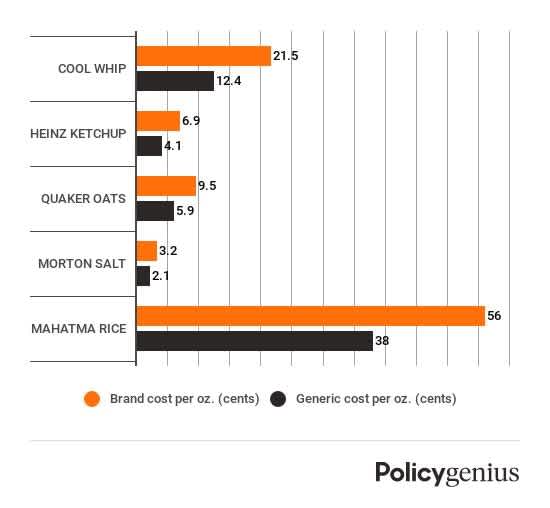Some people are decisive, like sea captains. Hard to starboard! Batten down the hatches! Abandon ship!
Some people are like me, standing in the grocery store aisle for an hour, frozen by all the available options for bread. One of the toughest choices to make while shopping is generic versus brand name. The store brand might be cheaper, but is it also lower quality?
It depends.
What's the difference?
Generic products have a bad reputation compared to their branded brothers and sisters. But private label (manufacturers prefer this term over "generic," understandably) is getting better and better, said Randal Constant, a social media and sales consultant in the food industry. Smaller companies are finding the best way to get onto grocery store shelves is to offer their products up as private label.
A recent report from Nielsen said the private label product sales grew three times faster than branded products at the end of 2017. Part of the reason is that grocery stores have more data on their consumers than manufacturers and can be more nimble in responding to their demands, Constant said.
In the past, grocery stores would hire manufacturers to make similar versions of branded products, said Jonathan Deutsch, professor of culinary arts and food science at Drexel University.
"You could work with a manufacturer, occasionally the same manufacturer making the branded product and do a store brand or an off-label brand that would be cheaper and similar or maybe slightly less in quality compared to the name brand," Deutsch said.
Today many sellers aim to offer high-quality private label products like the cauliflower pizza crust at Trader Joe's, Deutsch said. We're in a golden era for private label, he said. In general, the most successful generic products are those without a strong brand-name competitor.
"Canned beans, bottled juice, eggs, milk, almost all would have a store brand because consumers see them as pretty interchangeable," Deutsch said.
Deutsch buys many private label products and is rarely disappointed. But some products, like Tabasco sauce, or Doritos, are inimitable, he said. If you're looking for an exact flavor, a store brand may not be a perfect match.
But if you're not particular about a certain flavor, a store brand could save you money compared to paying for a better-marketed brand, Deutsch said. (Similar rules apply when it comes to what you should — or shouldn't — buy in bulk.)
"I know enough to understand, and I think a lot of consumers do as well, that you're essentially getting the same thing," Deutsch said.
A price comparison
Constant visited a Walmart in Gulfport, Mississippi, recently to see how generic prices compared to their branded counterparts. These are the five generics that offered the most savings compared to big brands, based on prices he saw.

These are five generics whose prices most closely matched their branded versions.

As Constant's visit shows, the generic versions of some items, like Cool Whip, can be almost 50% cheaper. Much of the difference depends on how the the big brands are marketed, Constant said. Customers are willing to pay more, and sellers are able to charge more, for familiar brands.
How to choose between generic & branded groceries
Price isn't everything. If you're considering buying a private label product, check the ingredients to make sure they match those of the equivalent branded product, Constant said. For example, a private label hamburger patty might be cheaper, but it might also contain lower-quality ingredients like beef hearts.
"I don't know about you, but I don't think you go shopping for beef hearts to make hamburgers," Constant said. (You can check out this recipe for a delicious $1.50 hamburger if you're looking to save instead.)
Determine what's important to you about a particular brand, Deutsch said. Some can't be replicated because of their particular flavor or a long-held loyalty. If not, and the ingredients match, then let price be a guide.
"If you're just looking for the product in commodity form and you're hard-pressed to distinguish what it is about that brand versus the private label that appeals to you, then a private label may be a better option for you," Deutsch said.
And if you can't decide, try them out at home.
"Compared to shopping for other things like cars and appliances, food is a relatively affordable investment," Deutsch said. "I would encourage consumers to break out of their usual habits and spend a couple of bucks, maybe buy both."
Before you go to the grocery store, try these 12 simple ways to lessen the time and money you spend.
